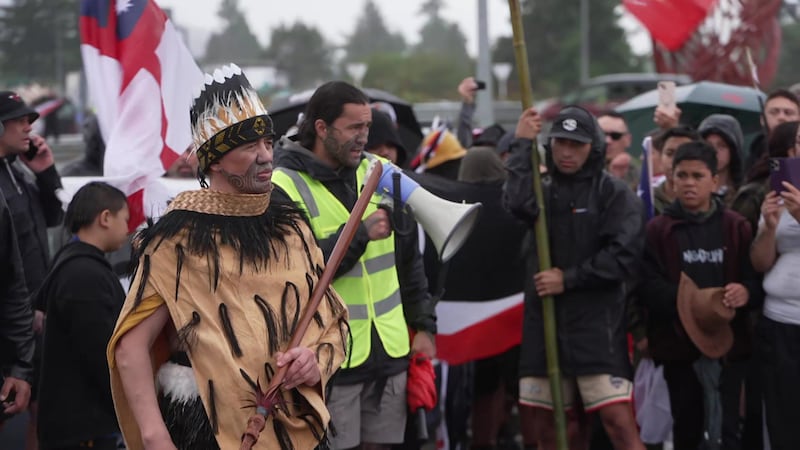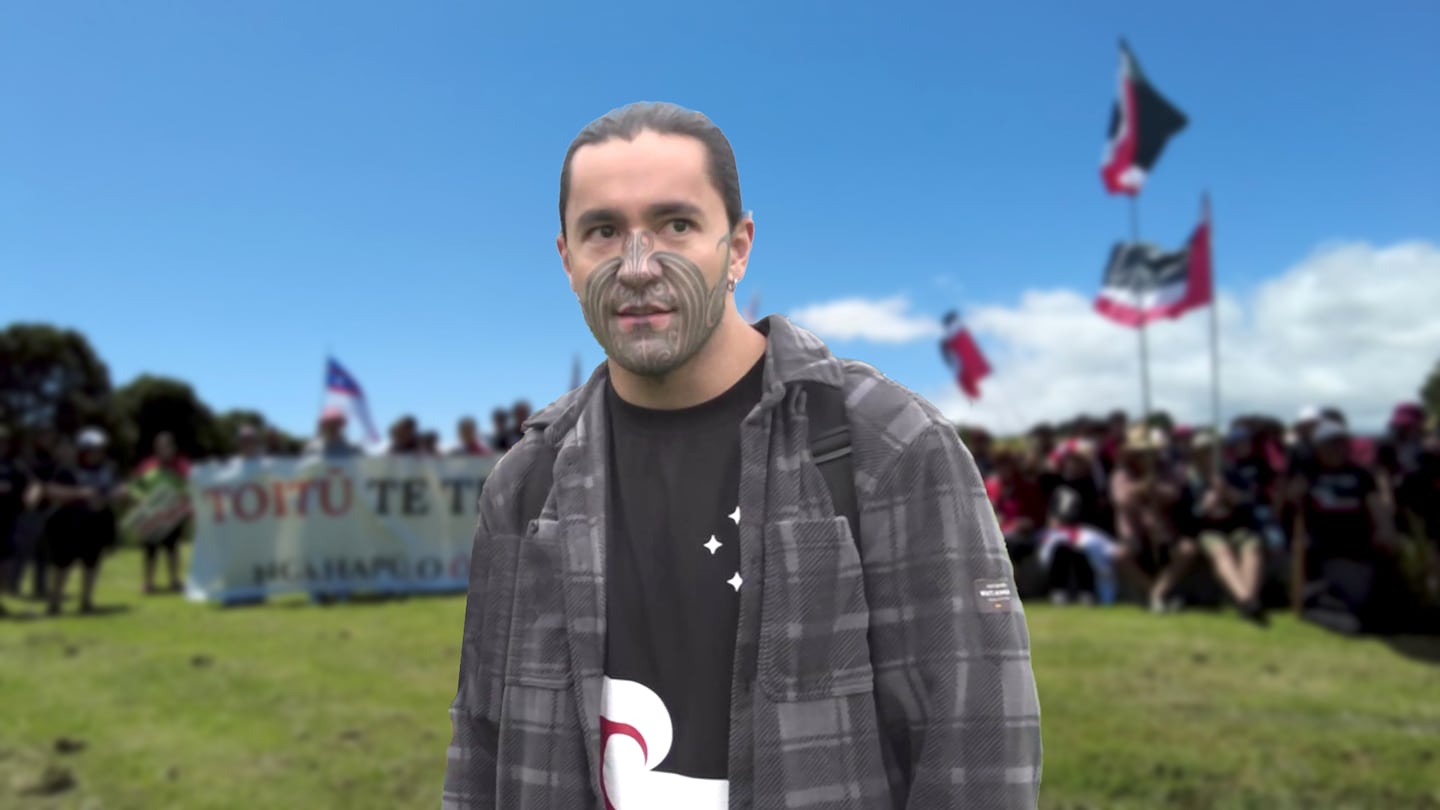This article first appeared on Stuff.
He is the voice and face of the hīkoi on its way to deliver a message to the government. Eru Kapa-Kingi tells how a boy from Whangārei became one of the leaders of a nationwide movement.
Eru Kapa-Kingi says he’s always had a powerful distaste for injustice.
His grandparents were part of the urban drift of Māori from the Far North, pulled to Whangārei by the promise of economic opportunity. It was their home where he and three siblings had a comfortable upbringing, and where he realised, from a young age, that not everyone was as lucky.
“We went to kōhanga and kura kaupapa for a year when we were living in Kirikiriroa, and when we moved to Whangārei, we were about 5 or 6 and that’s when we shifted over to mainstream schooling,” Kapa-Kingi (Te Aupōuri, Ngāpuhi) said.
“I went to Raurimu Avenue School and it was a decile one school. It was very reflective of the area we grew up in, which is Onerahi, in the valleys of where state housing is deliberately placed.
“The result of that, I guess, is what you’d call the development of hoods. I grew up in one of the hoods of Whangārei and, at the time I was living there, there was a very dominant presence of Black Power.”
Kapa-Kingi is 28 now, but when he was a kid there was a gang pad just around the corner from his home and he still remembers going to school with the children of gang members, who turned up with no shoes, no lunch.
“I guess the common pattern is, they all very much lived a life of poverty. I was lucky to have both parents at home, who worked hard and successfully kept us away from that life, even though it was literally next door to us,” he said.
“[But] I remember questioning, why these kids come to school with no shoes. How come I have shoes and they don’t? How come I have lunch every day? Why don’t they have the same things I have in my life?”
This curiosity only grew after Kapa-Kingi received a scholarship to Huanui College, a private school on “the other side of town” where he and his siblings were the only Māori in their years.
“The families there, they came from wealth and farming backgrounds and it was a significant culture shift. I really started to see with my own eyes what inequality looked like and it was mind-blowing,” he said.

“I felt a sense of duty or obligation to do something about it because if I was in a relatively stronger or privileged position than these people who looked just like me, then I felt I had to use that for a collective good.”
Kapa-Kingi said he was grateful for his education, the experience and what it taught him, he added that it came at the great cost of his culture.
“Through that whole time, neither me nor my brothers felt that confident in our Maoritanga… From the age of about 6, when we left kura, we didn’t speak te reo Māori at all until we got to university and realised the importance of not just learning te reo but everything that it encapsulates.”
A desire to reclaim his cultural identity coupled with his exposure to inequality at a young age, motivated Kapa-Kingi to work in an advocacy space. His parents had set great examples of what it meant to do mahi for the community, he said.
His father, Korotangi Kapa-Kingi, taught Māori arts at Te Wānanga o Aotearoa and his mother, Mariameno, was the general manager at Ngāti Hine Health Trust before being elected as Te Pāti Māori MP for Te Tai Tokerau in the 2023 general election.
Kapa-Kingi went on to study te reo Māori and Pākehā law at Te Herenga Waka - Victoria University before graduating with a conjoint law and arts degree with First Class Honours in law.
Now a professional teaching fellow at the University of Auckland, Kapa-Kingi teaches and designs compulsory courses on te ao Māori alongside the likes of respected te reo Māori teacher and “one of the greats of the game”, Te Kurataiaho Kapea.
“Now it’s about teaching our babies and normalising it for them so they don’t have to get to university and pay heaps of money to learn their own language.”
Now a key figure in the Toitū Te Tiriti movement, Kapa-Kingi who is a former candidate for Te Pāti Māori, said he has always been a staunch supporter of kaupapa Māori political parties and helped run his mother’s campaign.
But his close ties to politicians made him realise there was only so much that could be achieved “in a Pākehā political setting”.
“It’s very defensive, reactive and ultimately didn’t feel as liberating as it could be - that was the inception of this kaupapa of Toitū Te Tiriti which is solely anchored in the absolute liberation of te iwi Māori through the truth of Te Tiriti o Waitangi.
“It was a reaction and we launched the waka and it’s still sailing now.”
Still, Toitu Te Tiriti has strong links to Te Pāti Māori, with co-leader Rawiri Waititi highly visible in the North Island leg of the Hīkoi mō te Tiriti, while Māori Party MP Takuta Ferris has led the hīkoi from the south.
It’s a journey that began on Monday, November 11, at Te Rerenga Wairua/Cape Rēinga in the north and Bluff in the south, and is set to end at Parliament in Wellington on November 19, “to show the unity of Māori and Tangata Tiriti [and] to stop the Treaty Principles Bill”.
Alongside fellow Toitū Te Tiriti leaders Kiri Tamihere and Hohepa Thompson, Kapa-Kingi has been part of the movement since the beginning, spending hours on countless Zoom meetings and harnessing social media to mobilise supporters.
It’s been an epic journey so far, one that’s included making sure thousands of hīkoi supporters safely crossed the Auckland Harbour Bridge on Tuesday - something Kapa-Kingi described as amazing but also a relief.
In interviews with Stuff, senior marae figures likened him to Dame Whina Cooper who led the 1975 Māori land march across the Auckland Harbour Bridge.
“I am a mokopuna of hers, so I’m humbled by that, but I don’t think I’m deserving at this point,” Kapa-Kingi said.
“I’m following her footsteps and she sits in her own mana. I’m sure she would tell me to do the same.”



